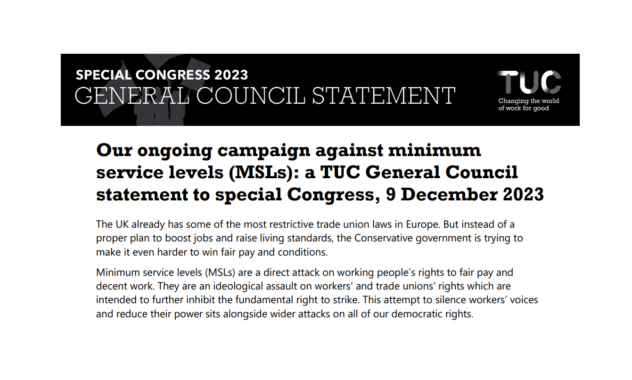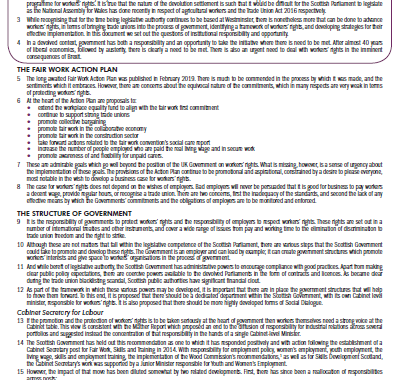
Charter of Workers’ Rights for Scotland
Adapting the IER's recommendations to benefit workers in Scotland.
Working with Scottish trade unions, IER Scotland has worked to identify how workers’ rights in Scotland can be strengthened under current constitutional arrangements.
Scotland’s Labour laws are a reminder of the devolution settlement that currently operates within the UK. Labour law itself is a reserved power – a matter for legislation by Westminster. So, the Scottish Parliament can vary income tax, legislate on the Health Service or education, leading to fundamentally different set ups, but can’t legislate on workers’ rights.
This is a serious anomaly, one where the Scottish Trades Union Congress (STUC) and the majority of Scottish unions have advocated that powers be devolved to Edinburgh, a position that is endorsed by IER Scotland. While the Manifesto for Labour Law when enacted by a Westminster government will provide a new playing field, its implementation remains some time away.
Meanwhile the need for Scottish workers to have improved rights remains fundamental. Working with Scottish trade unions, IER Scotland has worked to identify how workers’ rights in Scotland can be strengthened under current constitutional arrangements. That culminated in the Charter for Worers’ Rights for Scotland launched, at the 2019 STUC.
The World of Work in Scotland
Scotland is not immune to the conditions of precarious work. 700,000 Scots are on zero-hours contracts, with insecure hours and insecure wages, meaning an insecure lifestyle.
It’s not immune from low pay. It’s not a nirvana where equal pay has magically happened overnight. That was the lesson that the Glasgow equal pay strikers brought home earlier in the year.
It’s not a country where every workplace has a recognised trade union and recognised trade union procedures.
So while the Scottish government may not have legislative competence, it has obligations under international treaties. It is an employer. It can create government structures that promote workers interests. A Scottish government has administrative powers in the form of contracts and licences.
The Mather Review and Fair Work Action Plan
The Charter starts by recognising that there have been developments in Scotland over the past few years that have highlighted the need for change. This started from the ‘Working Together’ Review chaired by Jim Mather, comprising a number of representatives from the trade unions, industry and Scottish academics. The remit for that review was:
- To identify opportunities for innovation in the workplace which will enhance productivity, workplace development and build a more secure and resilient labour force;
- The need to build on existing good practice, recognising the benefits good workplace relations deliver and how these might be more widely adopted and secured; and
- To identify opportunities to promote collective bargaining, workplace democracy, diversity and equality – including the participation of women.
The Mather review resulted in the Fair Work Convention, and the production of the Fair Work Action Plan. These documents talk the talk, encompassing support for strong trade unions, collective bargaining, and promotion of the real living wage. But while the sentiments are strong, they have not been matched by a firm commitment to implementation.
No one doubts that it is positive that these ideas are on the table. But aspiration needs to be matched by real commitment to change.
Too much of the Fair Work Action Plan is about encouraging good employers. But as the Charter specifically recognises, the case for Workers’ Rights does not depend on the whims of employers. It depends on enforceable standards.
What does the Charter say?
In creating the Charter of Workers’ Rights for Scotland, we have attempted to codify the basis of rights that are necessary to create firm, just, secure, democratic and productive conditions of work that will diminish inequality and benefit the national economy. The most productive economies are associated with strong workers’ rights and collective bargaining coverage.
That means respect for:
- The right to form and join a trade union
- Trade union facilities
- Trade union access to workplaces
- Right of Trade union recognition, made more efficient by simplified procedures
- The development of sectoral collective bargaining
- The right to strike and take solidarity action
IER Scotland want to see the Charter adopted as the fundamental standard against which employment practices and employers will be judged.
The key is how it will be implemented. Our recommendations lead the way.
Recommendations
-
Cabinet minister responsible for industrial relations
A Scottish government can and should have a single cabinet level minister responsible for industrial relations, and that the Cabinet Secretary in collaboration with unions and employers establish a register of employers committed to the Charter.
-
Robust system for reporting and compliance
This has to be backed up by the creation of machinery for reporting and compliance – based on International Labour Organization models of machinery, monitoring not in a vacuum but producing reports available to trade unions and where trade unions have a right to complain if an employer fails or appears to fail to comply with Charter provisions.
Enumerating trade union rights means nothing unless there are clear mechanisms to make them enforceable.
-
Ethical public procurement
Compliance itself has to be a relevant consideration in public procurement and in licensing. Wherever a contract or licence is granted, there is a requirement for a monitoring agency to ensure continued compliance to fair work standards.
-
Sectoral Collective Bargaining
These provisions need to be backed by the development of an economy-wide programme of sectoral collective bargaining. Revitalising collective bargaining expands trade union impact, raises wages and enhances worker protection.








